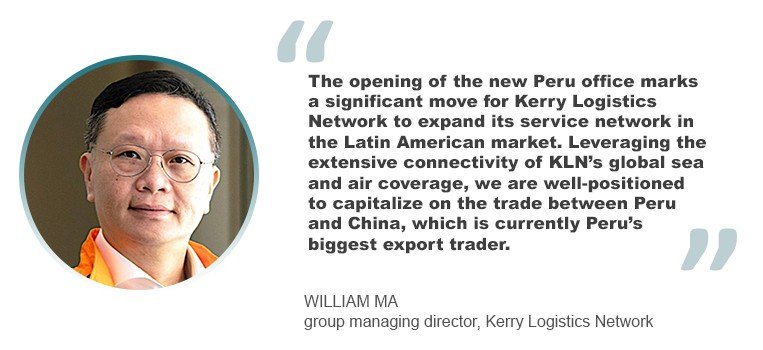Logistics companies in Asia are ramping up their South America operations and building more connections within the two regions driven by trade growth and a surge in ecommerce.
Several firms have announced expansions both in air and sea networks between Asia and South America as volumes accelerate and further growth prospects are expected.
Hong Kong-based Kerry Logistics extended its coverage in Latin America by opening an office in Lima, boosting its presence in the region and expanding its international freight forwarding capability by tapping into the Peruvian export trade.
The company said it is targeting the mining, apparel, automotive, high-tech and pharmaceutical industries.
“The opening of the new Peru office marks a significant move for Kerry Logistics Network to expand its service network in the Latin American market. Leveraging the extensive connectivity of KLN’s global sea and air coverage, we are well-positioned to capitalize on the trade between Peru and China, which is currently Peru’s biggest export trader,” William Ma, group managing director of Kerry Logistics Network, said.

Yang Ming also added one new 11,000 TEU container vessel to boost its South America service, citing a “high level of cargo demand” between Asia and South America.
“Given the latest, higher level of cargo demand and the developing port infrastructure of several main ports in South America, the deployment of the YM Trust on our SA3 service will meet customer needs, maximize capacity utilization, and strengthen Yang Ming’s competitiveness in South America market,” the container line said.
ZIM Shipping introduced extra capacity to Brazil and Argentina by also adding a new South America service to cater for the increasing demand. The new monthly service provides direct connection between South China and South America, offering fast transit time to Santos, Itapoa and Buenos Aires for Shenzhen and Pearl River Delta exporters.
HMM last month also launched a new service connecting East Asia, India and Latin America.
The South Korean container line will operate the Far East-India-Latin America Service (FIL) service, which will start from Busan with a 84-day round voyage following the Busan, Shanghai, Ningbo, Shekou, Singapore, Kattupalli, Durban, Santos, Paranagua, Itapoa, Navegantes, Buenos Aires, Montevideo, Singapore, Hong Kong, Busan port rotation.
“We will continue to expand our presence in the Latin America trade that has a high potential for future growth and development,” an HMM official said.
The logistics arm of Alibaba Group, Cainiao Network, also boosted its partnership with Atlas Air for daily Asia-Latin America chartered flights in response to the growth of cross-border trade between China and Latin America, driven by the surge in volume growth between the two regions.
It said with the launch of the daily flights, Cainiao’s weekly cargo volume from China to Latin America has increased 144% compared to last October, when there were only three chartered flights per week.
According to Cainiao, the number of parcels shipped to Brazil in September 2021 increased by 200% as compared to the same month last year despite the pandemic-stymied flows of ecommerce into Latin America.
This prompted Cainiao to roll out a “12-day delivery service” in Brazil’s core metropolitan areas. The Chinese logistics firm also noted plans to establish a distribution center in Brazil and to offer next-day or same-day delivery, in partnership with local final-mile providers.
A Statista study in September showed good growth prospects in Latin America. It said the number of online buyers will grow more than 20% from its current level of 300 million by 2025.
Online retail sales in Latin America are also expected to reach US$85 billion this year, growing 36.7% and is forecasted to reach US$160 billion by 2025 with Brazil and Mexico as the leading markets.
Southeast Asia’s ecommerce juggernaut, Shopee, also recently made expansions in Latin America with launches in Chile and Colombia after earlier entering Brazil and Mexico.
The Association of Asia Pacific Airlines (AAPA) told Asia Cargo News that the expansion of Asia-Latin America connections was a welcome opportunity for Asia-based airlines.
“Several countries in South America are open for business and some, like Colombia, hardly closed their borders during the pandemic,” a spokesperson of the Kuala-Lumpur based group said. “These routes have been developing over time in terms of trade and the open economies during the crisis are enjoying an accelerator effect.”
Charlee C. Delavin


-x-large.jpg)
